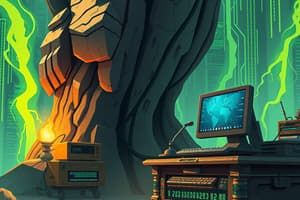Podcast
Questions and Answers
What characterizes a computer program?
What characterizes a computer program?
- A collection of graphical representations
- A non-systematic approach to coding
- A sequential set of instructions in a computer language (correct)
- A random set of instructions
Why is proficiency in programming considered a valuable skill?
Why is proficiency in programming considered a valuable skill?
- It requires no logical reasoning.
- It limits creativity in problem-solving.
- It creates less job opportunities in technology.
- It enhances critical thinking and problem-solving abilities. (correct)
What is the primary purpose of programming?
What is the primary purpose of programming?
- To manage hardware components directly
- To create graphics and animations for games
- To instruct computers to perform specific tasks (correct)
- To design user interfaces exclusively
What was the initial method of programming?
What was the initial method of programming?
What do high-level programming languages provide compared to machine code?
What do high-level programming languages provide compared to machine code?
Which programming language provides direct control over computer hardware and is often used for tasks requiring precise control?
Which programming language provides direct control over computer hardware and is often used for tasks requiring precise control?
What term describes a unique instruction given to a computer application to perform a task?
What term describes a unique instruction given to a computer application to perform a task?
In programming, what is the main purpose of a high-level language?
In programming, what is the main purpose of a high-level language?
What do Integrated Development Environments (IDEs) primarily assist programmers with?
What do Integrated Development Environments (IDEs) primarily assist programmers with?
Which of the following is a collection of useful resources that can be used in conjunction with programming?
Which of the following is a collection of useful resources that can be used in conjunction with programming?
What is the primary function of an interpreter in programming?
What is the primary function of an interpreter in programming?
Which step in the programming problem-solving process involves evaluating the problem requirements?
Which step in the programming problem-solving process involves evaluating the problem requirements?
What type of programming tool is a compiler?
What type of programming tool is a compiler?
Which of the following is NOT a step in the problem-solving process in programming?
Which of the following is NOT a step in the problem-solving process in programming?
What must be known to find the volume of a rectangle using the provided algorithm?
What must be known to find the volume of a rectangle using the provided algorithm?
What is the primary use of pseudocode in algorithm representation?
What is the primary use of pseudocode in algorithm representation?
Which keyword is NOT typically used in writing pseudocode?
Which keyword is NOT typically used in writing pseudocode?
What is the benefit of using flowcharts over pseudocode when representing algorithms?
What is the benefit of using flowcharts over pseudocode when representing algorithms?
In which category do program flowcharts fit?
In which category do program flowcharts fit?
Which of the following symbols is used to denote arithmetic operations in pseudocode?
Which of the following symbols is used to denote arithmetic operations in pseudocode?
What symbol is used to show the start and end of a set of computer-related processes?
What symbol is used to show the start and end of a set of computer-related processes?
Which symbol represents any processing performed by a computer system?
Which symbol represents any processing performed by a computer system?
What does the Decision symbol in a flowchart indicate?
What does the Decision symbol in a flowchart indicate?
Which symbol should be used to connect parts of a flowchart that continue on the same page?
Which symbol should be used to connect parts of a flowchart that continue on the same page?
What is the purpose of the Document Input/Output symbol?
What is the purpose of the Document Input/Output symbol?
Which symbol is used for writing any explanatory statement required to clarify something?
Which symbol is used for writing any explanatory statement required to clarify something?
What do Flow lines in a flowchart represent?
What do Flow lines in a flowchart represent?
What does the Off-page Connector symbol do in a flowchart?
What does the Off-page Connector symbol do in a flowchart?
Flashcards are hidden until you start studying
Study Notes
Basics of Programming
- A computer program consists of sequential instructions, known as codes, written in a programming language to execute specific tasks.
- Types of software include system software, web browsers, utility software, multimedia software, and spreadsheet software.
- Instructions in a program must generally follow a sequential order unless specified otherwise.
- A programming language is a set of grammatical rules that enables communication with a computer for task execution.
Importance of Programming
- Programming combines art and science to instruct computers on how to perform tasks.
- It enables the creation of solutions to problems through coding.
- Proficiency in programming opens numerous career opportunities in software development, web development, data science, and artificial intelligence.
- Enhances critical thinking, logical reasoning, and problem-solving abilities by breaking complex tasks into manageable steps.
Evolution and History of Programming
- Initial programming involved writing machine code, which consisted of binary instructions (0s and 1s).
- The development of high-level programming languages simplified coding processes, allowing for easier management and control over hardware.
- Low-level programming includes languages like Assembly Language and Machine Language, while high-level languages include C++, Pascal, PHP, Python, and Java.
- Factors influencing the choice of programming language include project requirements, performance needs, community support, and available libraries.
Key Programming Terminology
- Syntax: Refers to the set of rules governing symbols and characters in a programming language.
- Command: Unique instructions for a computer application (e.g., "print" for displaying text).
- Integrated Development Environment (IDE): Software application that formats code, checks syntax, and runs/test code, supporting multiple programming languages or being specific to one.
- Library: Pre-built collection of functions and resources, configured to work together within an IDE.
- Interpreter: Program that directly executes high-level language instructions without conversion to machine language.
- Assembler: Converts low-level assembly code into machine language.
- Compiler: Converts high-level programming languages into machine-readable code.
Algorithm, Pseudocode, and Flowchart
- Algorithm: A set of steps that produces a sequence of computational operations aimed at solving a problem.
- The problem-solving process involves problem analysis, algorithm design, coding, and execution verification.
- Pseudocode: Describes algorithm steps in a simplified manner using common symbols and keywords, making it user-friendly to individuals with basic programming knowledge.
- Example of pseudocode to find the volume of a rectangle:
- READ length
- READ width
- READ height
- COMPUTE volume as length * width * height
- PRINT volume
- Flowchart: A pictorial representation of an algorithm’s steps, illustrating program or system processes using different shapes for various operations.
- There are two types of flowcharts: Program flowcharts (logical steps of a program) and System flowcharts (showing data flow and decision impacts).
- Standard flowchart symbols include:
- Terminal: Indicates start/end of processes.
- Input/Output: Represents input/output operations.
- Computer Processing: Signifies processing tasks.
- Decision: Point where a decision affects the flow of processes.
Studying That Suits You
Use AI to generate personalized quizzes and flashcards to suit your learning preferences.




